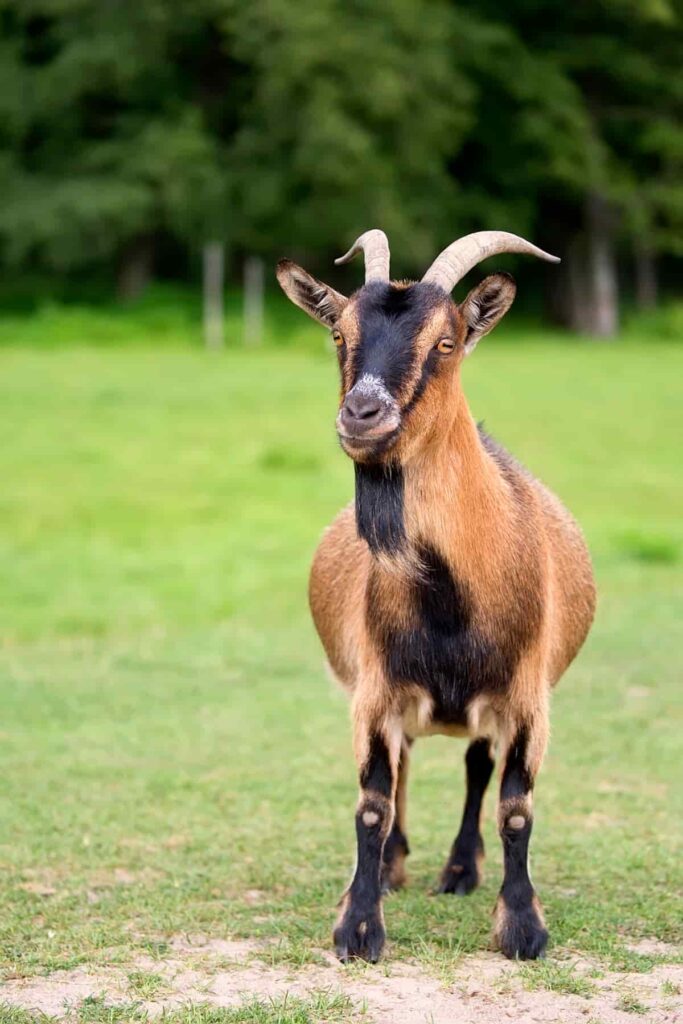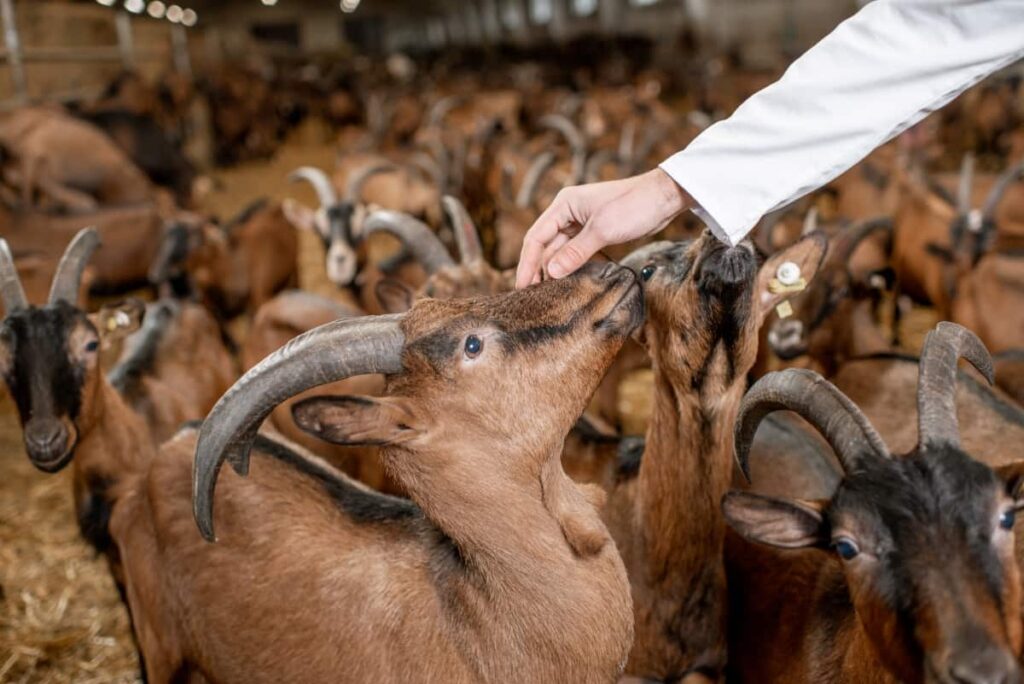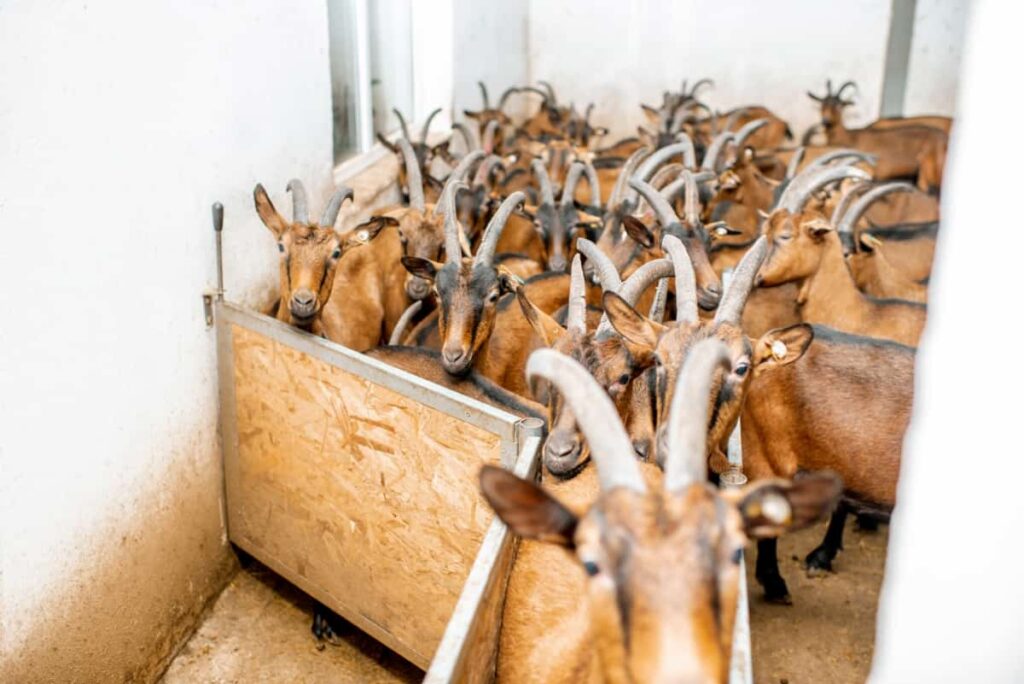The Ganjam goat breed, also known as Dalua, is native to eastern India and has been praised for its dual-purpose nature. This breed has been around for generations and is primarily found in Gajapati, Rayagada, and Koraput districts in Odisha. A small number can also be found in Sikkim. Ganjam goats have become increasingly popular due to their adaptability to various climates and disease resistance. Farmers who choose to raise them benefit from a reliable source of income through selling meat or dairy products while contributing positively to their local economy.

Ganjam Goat Farming
Facts About Ganjam Goats
- Weight (kg): Adult Male-44, Adult Female-32
- Body: Tall and leggy animal with a body of medium size.
- Daily milk production: 300-400 gm
- Lactation period: 130-150 days
The Appearance of Ganjam Goats
- The Ganjam goat is a tall and leggy animal with a medium-sized body. Its distinct ground clearance makes it easy for the goats to move around freely. The body coat of the Ganjam goat is predominantly black, but some animals have white spots on their coats.
- The hairs of the Ganjam goat are short and lustrous, adding to its overall beauty. This breed of goat produces about 300-400 gm of milk daily during its lactation period, which lasts between 130-150 days. While not as high in milk production as other dairy breeds, this amount is still sufficient for small-scale farmers.
- Ganjam goats are primarily raised for meat due to their excellent quality and fast growth rate.
Characteristics of Ganjam Goats
- These goats are tall and leggy with distinct ground clearance. They have a medium-sized body and are mostly used for meat purposes.
- The body coat of Ganjam goats is predominantly black, but some animals have white spots too. Their hair is short and lustrous, which makes them an attractive breed to many farmers.
- One of the primary reasons many farmers raise Ganjam goats is their meat quality. These goats produce high-quality meat that has a delicious taste and texture. The demand for goat meat increases globally because it contains less fat than beef or pork. Apart from being bred for meat production, Ganjam goats also produce milk.
- The Ganjam breed of goats is known for its medium-sized body. Adult males of this breed have an average weight of 44 kg, while adult females weigh around 32 kg. This makes them ideal for meat production purposes.
- Ganjam goats are hardy and can adapt to various climatic conditions, making them easy to rear.
How to Start Ganjam Goat Farming?
- Conduct thorough research on the breed, its characteristics, and market demand for meat and other products these goats produce. You should also consider your budget and available land area for grazing and shelter needs.
- Select healthy breeding stock from reputable breeders who can provide quality animals that match your goals. It’s important to ensure that the animals have been vaccinated against common diseases.
- Ensure their environment is clean and comfortable while providing adequate food and water. Proper disease management practices should be implemented to prevent any possible outbreak of illnesses among the herd.
- Network with local farmers or cooperative societies for guidance on selling your product at profitable prices in neighboring markets or retailers around the country.
In case you missed it: Marketing Trends/Strategies and Opportunities for Goat Products

Tips for Raising Ganjam Goats
- Select Good Quality Breed – Choose healthy and disease-free animals with good physical characteristics such as long legs, medium-sized body, and predominantly black coats.
- Proper Nutrition – Provide your goats with nutritious feed, clean water, mineral supplements, and fresh green fodder to maintain their health.
- Housing Requirements – Build a spacious shed that provides adequate space for each animal to move freely. Ensure proper ventilation to avoid respiratory problems.
- Regular Vaccinations – Schedule regular vaccinations according to the recommended schedule from local veterinarians or animal husbandry departments.
- Breeding Strategies – Plan breeding programs to produce high-quality offspring using effective breeding techniques such as artificial insemination or natural mating.
- Disease Management – Monitor your herd regularly for signs of illness or infection and take appropriate measures to treat diseased animals promptly
Requirements to Start Ganjam Goat Farming
- Provide adequate housing for the goats. The shelter should be spacious enough to accommodate all the goats comfortably and protect them from harsh weather conditions such as rain and extreme temperatures.
- Proper nutrition is crucial for Ganjam Goats’ health and productivity.
- Regular medical check-ups are necessary to prevent diseases or detect health issues early on. Vaccinations against common illnesses can be given periodically too.
- A clean environment is vital in Ganjam Goat Farming management rules. A dirty environment can lead to animal diseases, low productivity levels, or death; hence, cleanliness ensures hygiene standards are met, thus, disease control measures are taken effectively.
- Invest in high-quality feed suitable for adult goats and those in lactation. Consult with veterinary experts to take care of their regular medical check-ups like vaccination schedules or deworming treatments.
- Ganjam goat farming requires continuous monitoring of the herd through observing each animal’s behavior coupled with close attention by farmers ensuring they adhere strictly to these management guidelines, which will help maintain optimal growth rate while reducing risks associated with poor practices that may affect production levels negatively over time.
Ganjam Goat Health Care Tips
- The most common problem faced by goat farmers is parasitic infestation. These parasites can cause serious animal health issues and reduce their productivity.
- Keeping your farm clean and maintaining proper hygiene levels is crucial to prevent parasitic infections. Regular deworming and vaccination are also essential in controlling parasitic infestations.
- Another issue that often arises when raising Ganjam goats is poor nutrition. Providing adequate feed and water to your animals ensures optimal growth rates and high milk production.
- Additionally, breeding management plays a significant role in the success of any goat farming business. It’s important to ensure healthy breeding stock with desirable traits such as high fertility rates, good mothering abilities, and excellent meat quality.
- Raising Ganjam goats requires careful planning and attention to detail to overcome these potential challenges effectively. Following proper management practices such as regular veterinary check-ups and maintaining adequate nutrition levels, among other things, will help improve the overall health of your herd while increasing profitability over time.
In case you missed it: Entrepreneurship Opportunities in Goat Farming

Conclusion
The Ganjam goat is a dual-purpose breed used for meat production and milk production during their lactation period. Its high-quality meat production and low maintenance needs compared to other breeds make it an attractive choice for farmers across India looking into goat farming as a profitable venture.
- Types of Grass Growing for Goat Farm
- How to Train Goats for Milking: A Beginners Guide
- Goat Milking Practices and Equipment: A Beginner’s Guide
- Goat Farming for Fiber: Producing Mohair and Cashmere
- Maximizing Goat Milk Production: Tips for Dairy Goat Farmers
- Goat Farming as a Family Business: Strategies for Success
- Profitable Kenya Goat Breeds for Commercial Dairy and Meat Business
- Unlock the Secrets of Oberhasli Goat: Discover Raising and Management Practices
- Ultimate Guide to Myotonic Goats: Explore Profile to Raising